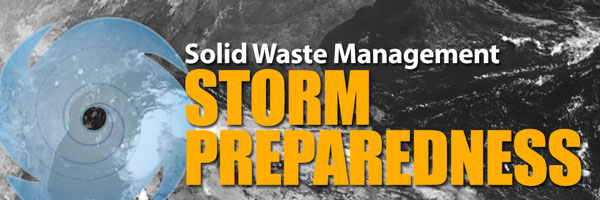 > Solid Waste Management Storm Preparedness
> Solid Waste Management Storm Preparedness
Solid Waste Management Department
Storm Preparedness

Hurricane Harvey
The City of Houston is monitoring Hurricane Harvey in the Gulf of Mexico. Houston residents can expect to see a significant amount of rainfall over the next five days, which will likely lead to flooding. It is important that Houston residents stay aware, and begin taking steps in the event Hurricane conditions affect our area in the next few days.
Solid Waste Management Storm Preparedness TIPS
Before a Storm:
- Secure your City of Houston GREEN and BLACK carts. Store carts in a safe place out of high winds or tie them down securely.
- Visit our website, www.houstonsolidwaste.org, for information on garbage and recycling collection interruptions.
- Do not put out bulk trash or yard waste when a weather event is forecast or when a Hurricane WATCH or WARNING is issued.
- Include large garbage bags with your emergency supply kit for waste disposal.
- For official City of Houston Hurricane information please visit www.houstonemergency.org.
- Visit our website, www.houstonsolidwaste.org, for notification of suspended collection services.
- Put all household waste in garbage bags for disposal and seal tightly to prevent unsanitary conditions.
- Do not forget to separate your recyclable items from your regular garbage.
- Stay tuned to local television and radio stations for official City of Houston Hurricane information please visit www.houstonemergency.org.
- Be prepared for adjustments to collection schedules after a declared storm.
- Place all trash in an accessible area away from power lines, fences, water meters and trees.
Stay Informed
When tropical weather is beginning to form, and during storm impact, it is important to remain informed. Ahead of time, stay aware of conditions by following information from the National Hurricane Center and the National Weather Service Houston/Galveston Forecast Office. For official City of Houston flooding information please visit www.houstonemergency.org.
The City of Houston uses AlertHouston to communicate with the public during emergencies, including tropical systems. Sign up at houstonemergency.org/alerts for information, and to sign up. You may also follow @AlertHouston on Twitter and Facebook for the latest information.
Have a Hurricane Kit
Having basic supplies ahead of time will give you peace of mind and help make sure your family has what it needs if a quick-onset storm happens. The City of Houston recommends people have two kinds of emergency kits: a Shelter-in-Place -Kit and Stay-At-Home kit.
Shelter-in-place kit
Your shelter-in-place kit should be used for emergencies where you might have to quickly evacuate or shelter in place. Supplies in a shelter-in-place kit are intended to help people survive the first 24-72 hours in an evacuation or shelter-in-place situation.
Your shelter-in-place kit should contain:
- Copies of your important papers in a waterproof bag.
- Extra set of car and house keys.
- Extra mobile phone charger.
- Bottled water and snacks such as energy or granola bars.
- First-aid supplies, flashlight, and whistle.
- Battery-powered or hand-crank radio (with extra batteries, if needed).
- A list of the medications each member of your family needs and at least a 14-day supply of each medication.
- Toothpaste, toothbrushes, wet cleansing wipes, and so on.
- Contact and meeting place information for your family and a map of your local area.
- A stuffed animal or toy for your child and something to help occupy their time, like books or coloring books. If this includes a hand-held video game, make sure you have extra batteries.
- Rain ponchos.
- External mobile phone battery pack or solar charger. Some hand-crank flashlights will also include a phone charger
Special Considerations
- Always to remember that no two families are alike. If you have infants or very young children, or if you are elderly or disabled, you may have additional items that you need every day that should be in your go kit.
Stay-at-Home Kit
There may be situations where you need to stay in your home for a period of time. This includes riding out a hurricane.
Special Considerations
- Water (one gallon per person per day, for drinking and sanitation—up to a 7-day supply).
- Non-perishable food (up to a 7-day supply per person).
- Battery-powered radio (with extra batteries) or hand-crank radio.
- Weather radio with tone alert and extra batteries.
- Flashlight and extra batteries.
- First-aid supplies.
- Whistle to signal for help.
- Filter mask or cotton t-shirt, to help filter the air.
- Moist towelettes, garbage bags, soap, disinfectant, and plastic ties for personal sanitation.
- Wrench or pliers to turn off utilities (water and electric).
- Manual can opener if your kit contains canned food.
- Plastic sheeting and duct tape to shelter-in-place (see pages 26-27).
- Plastic tarps for emergency roof repair.
- Items for unique family needs, such as daily prescription medications, infant formula, or diapers.
- Mess kits, paper cups, plates, and plastic utensils.
- Cash and change.
- Paper towels.
- Fire extinguisher.
- Matches in a waterproof container.
- Rain gear, sturdy shoes, long pants, and gloves.
- Important family documents such as copies of insurance policies, identification, birth certificates, passports, and bank account records in a waterproof, portable container.
- A stuffed animal or toy for your child and something to help occupy their time, like books or coloring books. If this includes a hand-held video game, make sure you have extra batteries.
